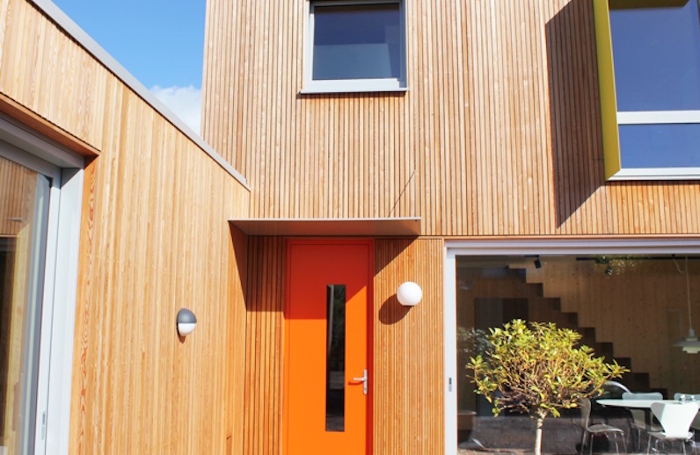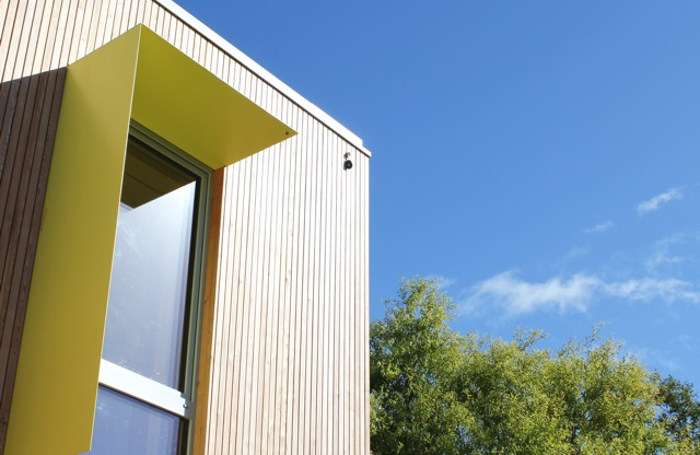“We need to provide leadership,” states architect Ruth Butler. “Let's show everyone that great architecture is at the core of sustainable building”.
Ruth Butler Architects is one of numerous practices that has committed to the RIBA’s 2030 Climate Challenge, which launched last month. It asks RIBA Chartered Practices to set out now on a trajectory that will deliver net zero whole-life carbon for new buildings and full refurbishment projects by 2030.
Since designing and building her own house to Passivhaus standards three years ago, Butler has insisted on working to the standard for all projects.
“Once you’ve built a low energy building, it’s hard to go back,” she enthuses.
Educating the client and contractor is an important part of a successful low carbon build. Butler has found that arranging an introductory day for a contractor is invaluable. To this end she has previously enlisted the services of Bill Butcher, Director of the Green Building Store for a contractor to contractor Passivhaus induction.
After one of these training days, the contractor decided then and there to attempt to exceed the brief and attain a Passivhaus new-build level for what was only a refurbishment scheme.
Butler regards measuring embodied carbon as her next step and the most interesting challenge ahead. Measuring embodied carbon, which has to be eventually reduced by 50 to 70%, is another cornerstone of the challenge.
ECD Architects has been promoting sustainable architecture for almost 40 years. The practice generally relies on the Passivhaus Planning Package (PHPP) to predict operational energy (as kWh/m2/y) of projects.
Embodied carbon is something the practice is starting to look at for larger schemes and refurbishment projects, says ECD’s Head of Sustainability Loreana Padron. And, like Ruth Butler, Padron adds that there is a lot of education needed for clients and contractors. ECD often provides its own seminars for clients on low energy design, incentivising challenging targets.

The new RIBA Plan of Work will make this process smoother for all sides, she believes. New RIBA Plan of Work guidance will be published soon, together with a guide on Sustainable Outcomes aligned to the UN Sustainable Development Goals.
Alastair Mallett, Technical Director at Noviun Architects, agrees with Padron. Once the new Plan of Work is published and Noviun embed the 2030 Climate Challenge targets into their bid documents, informed clients will be looking to their professional team to deliver them, he believes.
Noviun specialises in schools, and Mallett notes that the practice has a project on site that was designed three years ago but meets the 2030 Climate Challenge target for operational energy. One of their projects, completed 18 months ago, was approaching the standards of the 2030 target. "We’re are comforted that we seem to be tackling the current issues," Mallett says.
Post occupancy evaluation (POE) is one aspect of the challenge that Noviun need to address. Reducing operational energy by the Challenge’s target of at least 75% will require POE of some form.
“We are aware that to close the performance gap between design and actual operational performance, reliable data is needed,” he admits. “The more that we know, the better informed the project team will be and the better we can advise our clients.”

Mallett suggests that detailed POE will have to be a collaboration with service engineers, as they have the tools to measure operational energy and potable water usage.
“We realise we have a way to go in reaching all of the targets set in the 2030 Climate Challenge. However, with the changing attitudes of Local Authorities, we firmly believe that all of these are attainable.”
Implementation of improvements to energy performance across the industry is in all likelihood inevitable, with the Future Homes Standard and revisions to Approved Documents for Part L and Part F for dwellings all at the consultation stage.
“More than 200 councils have now signed up to carbon reduction targets. Planning authorities in London and Manchester have the power to insist new developments comply with zero carbon targets. Once further local authorities adopt this approach, all developments can embrace the carbon reduction programme.”
“In this era of climate emergency, every industry must question its practice,” affirms Maria Smith, whose practice Interrobang have also signed up to the 2030 Climate Challenge. “Over 700 practices and RIBA have declared a climate emergency. This challenge now is to declare – by quantifying and publishing – our part in the crisis and our part in its solution.”
Thanks to Alastair Mallett, Technical Director, Noviun Architects; Loreana Padron, Associate Director & Head of Sustainability, ECD Architects; Ruth Butler, Director, Ruth Butler Architects; and Maria Smith, Director, Interrobang.
Text by Neal Morris. This is a Professional Feature edited by the RIBA Practice team. Send us your feedback and ideas.
RIBA Core Curriculum Topic: Sustainable architecture.
As part of the flexible RIBA CPD programme, Professional Features count as microlearning. See further information on the updated RIBA CPD Core Curriculum and on fulfilling your CPD requirements as an RIBA Chartered Member.
Posted on 7 November 2019.









